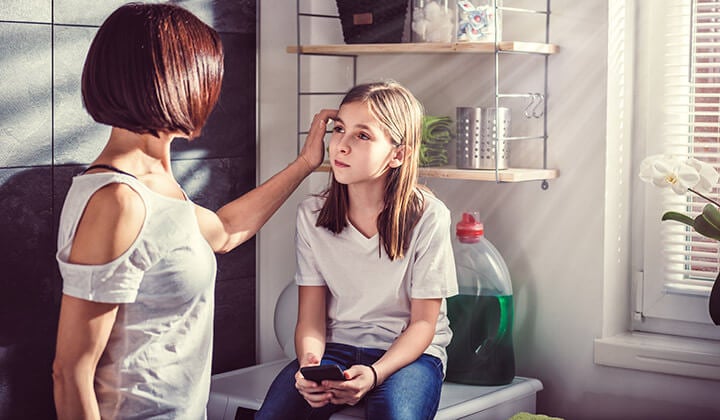
No parent wants to have to talk about tragic events with their kids, no matter what age they are. Whether something terrible happened close to home or in the headlines, knowing what to say and how to help kids cope isn’t easy.
Put on your own oxygen mask first
When you first hear the awful news, it is completely natural to experience all sorts of feelings: sadness, anger, frustration, helplessness and the list goes on. Give yourself time to process your own reactions, by yourself or with a trusted friend or counselor. By creating space for yourself, you will be better able to help your kids express their feelings without mixing them up with your own.
Ask questions before giving answers
Just as you have an initial reaction when you learn about something horrible happening, kids will have their own reactions. They may share some of your thoughts and feelings. They may have completely different concerns. Before you jump in with information and advice, start by asking what they have heard. Then, ask them if they have any questions. The more calm listening you do, the better.
Consider what they need
Every kid is different and there is no one-size-fits-all approach to conversations about traumatic events. You, as their parent or caregiver, know them best, and can take into consideration things that will affect how they process difficult news.
Age and developmental level
The younger the child and the less cognitively developed, the less detail you need to go into when discussing the event. Keep it brief, be clear and honest, and stay open to their questions. School-aged kids and teens will probably want more information. Generally speaking, you can tell them what happened and where, and what is being done to deal with the situation. No matter what age the child is, it is important to help them feel safe, validate their feelings, and let them know they can come to you with concerns.
Temperament
Just as there is no one right way to talk to kids about difficult news, there is no one right way for them to react to that news. Normal responses range from worrying aloud to staying quiet to appearing indifferent and everything in between. Accept their emotions and note any changes in behavior over time.
Proximity to the traumatic event
If the tragedy hit closer to home--in your community, family, or involving people the child knew--they may need greater supports over a longer period of time. Stay connected and aware of how the child processes grief or trauma over time. Sometimes they just need someone to sit with them in the discomfort.
Intellectual and developmental disabilities
Children with intellectual and developmental disabilities may react differently to news of a tragedy and may be comforted by different things than a child without. Think about what calms your child in other stressful situations and ask yourself if that approach might work in this instance. Social stories are available for talking about tragedy with youth who are less verbal (see resources below).
Limit exposure to disturbing media
For most kids, it will be enough to get information about what occurred from a trusted adult. They don’t need to see alarming images and videos online or on TV. Try to limit your own consumption of these images and don’t watch them when kids are present. If your child sees an image that upsets them, listen to how it made them feel and be ready to talk about it. Consider monitoring electronics use closely after these events to prevent accidental exposure.
Promote their resilience
Help your kids communicate their emotions in whatever way comes naturally to them, whether through conversation, creative expression, or another approach. Let them know that you and safety officials are doing everything they can to keep them safe and secure. If appropriate, make a safety plan together as a family. As much as you can, stick to routines you had prior to the event. Consistency helps kids regain a sense of normalcy. Give kids a chance to take action and help others. This gives them a positive focus and a healthy feeling of control.
Reassure - but not too much
When our kids are worried, we want to reassure them--and we should. The challenge is to find the right balance of checking in and providing reassurance, but not to overdo it and accidentally increase their worry. Too much reassurance can send the message that they should be worried when they are not. Similarly, over-preparing for a disaster or safety event can be frightening for children.
Look for signs that they may be struggling
- Physical symptoms: tiredness, headaches, stomachaches, or generally feeling unwell without identifiable cause.
- Eating habits: eating more or less than usual or in different ways.
- Sleep issues: trouble falling asleep or staying asleep, trouble waking up, having nightmares.
- Behavior: acting younger or more immature, becoming clingy. Teens may begin or change current patterns of alcohol or substance use.
- Emotional problems: prolonged sadness, depression, anxiety or fears.
The key here is to note changes for your child’s “normal.”
Ask for help when you need it
Find help locally
- Your child’s pediatrician
- A mental health professional
- A school counselor or social worker
Find helpful resources online
- American Academy of Pediatrics: Talking to Children About Tragedies and Other News Events
- American Academy of Child and Adolescent Psychiatry: Threats by Children: When are they Serious?
Related articles:

